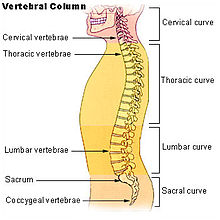Cervical spinal stenosis
This article relies largely or entirely on a single source. (December 2011) |
Cervical spinal stenosis is a bone disease involving the narrowing of the spinal canal at the level of the neck. It is frequently due to chronic degeneration,[1] but may also be congenital. Treatment is frequently surgical.[1]
Overview

Cervical spinal stenosis is one of the most common forms of spinal stenosis, along with lumbar spinal stenosis (which occurs at the level of the lower back instead of in the neck). Thoracic spinal stenosis, at the level of the mid-back, is much less common.[2] Cervical spinal stenosis can be far more dangerous by compressing the spinal cord. Cervical canal stenosis may lead to serious symptoms such as major body weakness and paralysis. Such severe spinal stenosis symptoms are virtually absent in lumbar stenosis, however, as the spinal cord terminates at the top end of the adult lumbar spine, with only nerve roots (cauda equina) continuing further down.[3] Cervical spinal stenosis is a condition involving narrowing of the spinal canal at the level of the neck. It is frequently due to chronic degeneration,[1] but may also be congenital or traumatic. Treatment frequently is surgical.[1]
Treatments
Non-surgical treatment
Potential non-surgical treatments include:
- Education about the course of the condition and how to relieve symptoms
- Medicines to relieve pain and inflammation, such as acetaminophen, nonsteroidal anti-inflammatory drugs (NSAIDs)
- Exercise, to maintain or achieve overall good health, aerobic exercise, such as riding a stationary bicycle, which allows for a forward lean, walking, or swimming can relieve symptoms
- Weight loss, to relieve symptoms and slow progression of the stenosis
- Physical therapy, to provide education, instruction, and support for self-care; physical therapy instructs on stretching and strength exercises that may lead to a decrease in pain and other symptoms
Surgery
Potential surgical treatments include:
- Anterior cervical discectomy and fusion - A surgical treatment of nerve root or spinal cord compression by decompressing the spinal cord and nerve roots of the cervical spine with a discectomy in order to stabilize the corresponding vertebrae.
- Laminoplasty - A surgical procedure relieve pressure on the spinal cord by cutting the lamina on both sides of the affected vertebrae (cutting through on one side and merely cutting a groove on the other) and then "swinging" the freed flap of bone open.
- Laminectomy - A surgical procedure in which the lamina of the vertebra is removed or trimmed to widen the spinal canal and create more space for the spinal nerves and thecal sac.[4]
References
- ^ a b c d Meyer F, Börm W, Thomé C (May 2008). "Degenerative cervical spinal stenosis: current strategies in diagnosis and treatment". Dtsch Arztebl Int. 105 (20): 366–72. doi:10.3238/arztebl.2008.0366. PMC 2696878. PMID 19626174.
- ^ Vokshoor A (February 14, 2010). "Spinal Stenosis". eMedicine. Retrieved December 30, 2010.
- ^ Waxman, SG (2000). Correlative Neuroanatomy (24th ed.).
- ^ "Laminectomy". Retrieved 19 December 2012.
